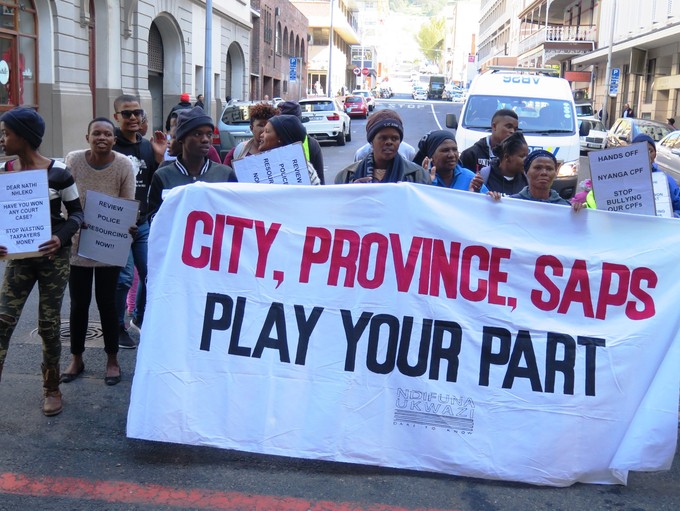
Supporters of the Nyanga Community Police Forum application demonstrate outside the Equality Court. Photo: Ashleigh Furlong
23 September 2016
The Nyanga Community Police Forum (CPF) succeeded today in their application to join the Social Justice Coalition and Equal Education’s Equality Court case which seeks fair police resource allocation.
The Nyanga CPF, represented in court by the Legal Resources Centre, argues that the Nyanga police precinct is under-resourced. Nyanga’s police precinct has the country’s highest number of murders.
Nyanga CPF chairperson Martin Makasi said that he was “excited” at the outcome of today’s judgement. He insisted that they were not fighting the police, but rather wanted the police “to relook at the policy” that was “failing the Nyanga community”.
“[It is] time for them to review the systems that they are applying [as they are] not working,” said Makasi.
One of the court’s conditions in granting the application was that the Nyanga CPF executive committee needs to meet to comply with the CPF constitution of the Western Cape. The CPF then needs to file an affidavit by 10 October, otherwise today’s order will lapse.
The South African Police Service (SAPS) had opposed Nyanga CPF’s application stating that, as the CPF was an organ of the state, it should not be able to challenge Saps, also an organ of state.
Outside court, supporters of the application sang and danced while holding up a large banner reading: “City, Province, Saps play your part”. Other signs read: “Hands off Nyanga CPF. Stop bullying our CPFs” and “Dear Nathi Nhleko have you won any court case? Stop wasting taxpayers’ money”.
The Equality Court litigation, which Nyanga CPF is now set to join, intends to compel Minister of Police Nathi Nhleko and Acting National Police Commissioner Kgomotso Phahlane to allocate police resources equitably.
The case follows the commission of inquiry into policing in Khayelitsha. The applicants believe that police resource allocation has not changed since the commission, despite recommendations calling for an overhaul of the system as a matter of urgency.